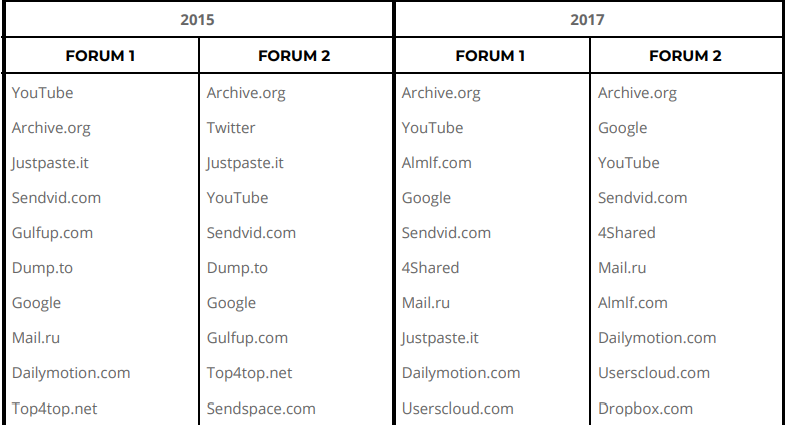While the Islamic State has been largely wiped off the physical battlefield, the terrorist group continues to maintain a steady presence on popular websites despite an increased push by tech companies to purge them.
On Tuesday, the cybersecurity firm Flashpoint released a new report that lists the most popular sources of ISIS propaganda over a three year period. Surprisingly, those sources did not change much over time as the group continued to rely on sites like Google, YouTube, and the Internet Archive to publish their messages.
Flashpoint, which monitors the so-called “dark web” on behalf of companies, conducted the research by examining web links posted in two underground forums where ISIS supporters share documents and videos, including executions and other violent fare. Here’s a table from the report that shows the most common websites from the two forums in 2015 and 2018:
As you can see, the most popular site has consistently been Internet Archive, the San Francisco-based non-profit group that compiles a historical record of web pages. According to Flashpoint analyst Ken Wolf, ISIS has been sharing links created automatically by Internet Archive’s web crawlers, as well as links members have uploaded to the site themselves.
In a statement to Fortune, a staff member at Internet Archive said the group works to quickly remove violent extremist content, or otherwise sequester it, so that it’s preserved but not visible to the general public.
“The Internet Archive has had and continues to have regular and productive meetings with thoughtful government officials from the U.S. and the EU (including the U.K.) on the topic of ISIS and other extremist content, which have lead to helpful changes in notification methods and removal responses,” said the group’s office manager, Chris Butler.
Meanwhile, Google and its subsidiary YouTube also figure prominently in the Flashpoint report. According to Wolf, ISIS regularly uses the company’s Photos and Drive products to share extremist content.
The company, which has faced scrutiny from politicians and advertisers over hosting violent content, did not respond to a request for comment. But as with Internet Archive, Google has a policy of quickly removing such fare.
Flashpoint says it did not monitor how long the links posted in the ISIS forums remained active, so it’s unclear how widely they were viewed. According to Wolf, there were about 400,000 unique links posted to both forums over the three years, and the volume of posted content has begun to decrease over time.
The other websites on the list include the Russian site mail.ru and ALMF.com, which is an Arabic language media-sharing site. There are also a number of so-called “paste sites,” which are used to post computer code or media.
The Flashpoint report also includes interesting findings about the success of one site, Twitter, in all but eradicating ISIS content from its platform. While the social media site accounted for over 15% of all URLs posted to the forum in 2015, that number dropped below 1% in 2016, presumably in response to a crackdown by the company.
In response to this drop, Flashpoint says ISIS leaders exhorted supporters to create more Twitter accounts but the campaign came up short.
“Brother, this task is impossible. I alone have had more than 120 accounts closed on Twitter. Sometimes, three accounts were closed in the same day. Even though I was not as active as other accounts. What is the benefit of accounts that are closed an hour after they are opened?” wrote one Arabic-speaking forum member, according to Flashpoint.














